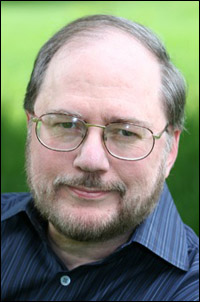
That is to say, he's been cast as the nebbishy, neurotic playwright David Shayne — a stand-in-for Allen — in the stage musical version of the Allen film Bullets Over Broadway. It will be the Broadway debut for the "Scrubs" actors, who has in recent seasons put in some time Off-Broadway, sometimes in plays of his own composition.
The cast will also feature Brooks Ashmanskas as actor Warner Purcell, Betsy Wolfe as Ellen, Lenny Wolpe as producer Julian Marx, Helene Yorke as the talentless moll and would-be-actress Olive Neal and Vincent Pastore as Olive's boyfriend gangster Nick Valenti, who is backing Shayne's show.
Additional casting, including the pivotal roles of manipulative older actress Helen Sinclair (originated on screen by Dianne Wiest, who won an Oscar for the performance), and Cheech, the artistically-leaning mobster who turns out to be betting at playwriting than Shayne, will be announced at a later date.
Susan Stroman directs and choreographs the musical that has been adapted by Allen from his 1994 film, which he co-wrote with Douglas McGrath. The musical incorporates pre-existing songs from the 1920s and 1930s for its score.
Bullets Over Broadway will begin previews March 11, 2014, prior to an April 10 opening night at the St. James Theatre. ***
| |
 |
|
| Rupert Holmes |
Producers Daryl Roth and Eva Price announced June 25 that Holmes' stage adaptation of A Time to Kill, John Grisham's best-selling crime novel, will begin previews Sept. 28 at the John Golden Theatre.
Though John Grisham has produced bestsellers for decades now, the play, which will officially open Oct. 20, is the first-ever Grisham property to be adapted for the stage. Ethan McSweeny will direct.
In association with Roth, Arena Stage in Washington, DC, gave the play its world premiere in May 2011. McSweeny directed there as well.
Courtroom dramas, once a regular staple on Broadway, have become a rarity in recent decades. The last notable success of the genre was A Few Good Men by Aaron Sorkin.
Grisham's book was made into a successful 1996 film starring Matthew McConaughey, Sandra Bullock, Samuel L. Jackson, Kevin Spacey and Oliver Platt.
***
A Night With Janis Joplin, the play about the doomed rock-blues '60s singer, which has played numerous regional venues around the country, will begin previews on Broadway Sept. 20 at the Lyceum Theatre.
| |
 |
|
| Mary Bridget Davies | ||
| Photo by Jim Cox |
Mary Bridget Davies, who received the 2013 Cleveland Critics Circle Award for Best Actress in a Musical and was nominated for a 2013 Helen Hayes Award for Outstanding Lead Actress in a Resident Musical, will reprise her role as the late Joplin on Broadway.
This isn't the first stage treatment of Joplin's life. Love, Janis, a musical tribute to the rocker adapted and directed by Randal Myler, played for two years at Off-Broadway's Village Theatre beginning in spring 2001. That production was best known for its inability to hold on to the actresses who played Joplin. The show opened with Catherine Curtin in the part, but quickly ran through a gamut of semi-famous and anonymous names, including Laura Branigan, Orfeh, Kristin Lee Kelly, Kate Forbes and Dana Fuchs. Hopefully, Roth & Co. have Davies on a long-term contract.
***
Nearly a half century after he hit the scene, Andrew Lloyd Webber is still writing new musicals. The world premiere of his latest musical Stephen Ward will begin performances Dec. 3 at the West End's Aldwych Theatre, prior to an official opening Dec. 19. Public booking opens June 28, for performances through March 1, 2014. Christopher Hampton and Don Black co-wrote the book. The production will be directed by Richard Eyre.
Who is Stephen Ward? Well, he was an unfortunate, but perhaps hardly innocent, man who got crushed under the wheels of media and government during the infamous 1963 Profumo Affair, a British public scandal that brought down a government. Ward was an osteopathic physician who mingled freely among England's rich and powerful. He was the unlucky man who introduced British cabinet minister John Profumo to a showgirl named Christine Keeler, who was also having an affair with a Russian spy at the time. Once the scandal broke, he was accused of living off money earned from the prostitution of Keeler and other, and he committed suicide on the final day of his trial.
***
The current habit of casting multiple child actors to fill title roles in Broadway musicals has spread to the current revival of Annie.
Producers announced June 27 that original star Lilla Crawford will play her final performance July 28. Taylor Richardson, who currently plays orphan Duffy in the Broadway revival, and Sadie Sink, a standby in the production, will graduate to the title role in the Tony Award-nominated revival at the Palace Theatre. The duo will begin to share the role of Annie July 30.
Two Annies isn't quite the same as four Matildas, but the former show is gaining ground.
***
The Barrymore Awards are back.
Last year, The Theatre Alliance, which had presented the awards, which honor Philadelphia theatre annually, announced it was closing its doors.
This week, Theatre Philadelphia declared the return of the awards. The prizes now feature a new voting system, which will include a return to a two-tiered organization with nominators and judges. The eligibility requirements that all theatres must meet to participate have become more rigorous and now include: the theatre must be a 501(c)3 or fiscally sponsored organization; each show must have a 12-performance minimum run; a minimum pay scale; and performances must happen within a 30-mile radius of City Hall. Eight nominators will be sent to see each eligible/participating production. Five votes in any one category will move the show to the next round, where all the judges (10-12) will be required to see the production.
The change in methodology that will take a show to the judge's level, which has been increased from three to five votes in any category, is designed to make the number of shows seen by judges more manageable. With this adjustment, judges will be required to see 50-60 productions each season, rather than the previous 90-100. Theatre Philadelphia believes this decrease in the amount of shows required will permit more theatre professionals to serve as judges.









